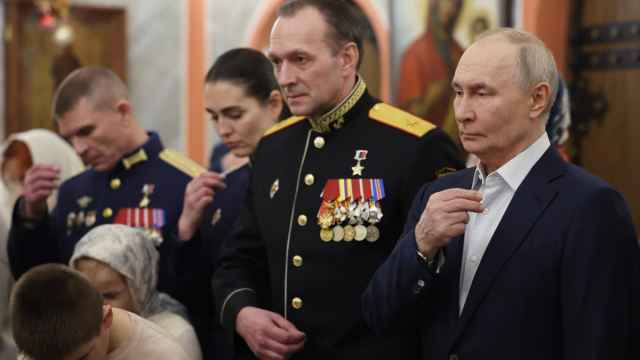President Dmitry Medvedev embarks on a rare trip to the West Bank and Jordan this week in a bid to revive stalled Israeli-Palestinian peace talks after their collapse at the end of last year.
A strike by Israeli diplomats earlier this month forced Medvedev to cancel a visit to Israel, leading him to reduce the Middle East trip to just the West Bank and Amman, where he will hold talks with Palestinian President Mahmoud Abbas and Jordan's King Abdullah on Tuesday and Wednesday, the Kremlin said.
His trip comes ahead of next month's meeting of the quartet of Middle East mediators — Russia, the European Union, the United Nations and the United States — which will convene in Munich to consider how to resuscitate the talks.
"Russia wants to revive the Middle East peace process and has been likely preparing for it," said Yevgeny Satanovsky, who heads the Middle East Institute think tank in Moscow.
U.S. diplomatic efforts to revive direct peace talks between Abbas and Israeli Prime Minister Benjamin Netanyahu collapsed late last year after Israel refused to extend a 10-month partial freeze on settlement building in the occupied West Bank.
Medvedev's trip is rare: The last time a Russian leader visited the West Bank was in 2005 by then-President and current Prime Minister Vladimir Putin.
"The [peace] process is not in the best shape, but I would not call it dead," Foreign Minister Sergei Lavrov told reporters at his annual news conference Thursday. "We actively supported U.S. efforts, but it became clear toward the end of last year that these efforts were insufficient."
Though a long-time partner of Israel, Russia has also signed deals to sell Syria warplanes, anti-tank weapons and air defense systems, prompting anger from Syria's regional foe. Israel said it was "disappointed" when Medvedev met last year with Khaled Meshaal, the exiled leader of Palestinian Islamist group Hamas.
Some have cast doubt on Russia's ability to significantly influence the talks.
"Russia does not have enough resources to play a leading role in the region," said Moscow-based security analyst Alexander Golts. "The Arab nations use Moscow to irk the West, but when they actually want a compromise with them, they go straight to the [Western] decision makers."
A Message from The Moscow Times:
Dear readers,
We are facing unprecedented challenges. Russia's Prosecutor General's Office has designated The Moscow Times as an "undesirable" organization, criminalizing our work and putting our staff at risk of prosecution. This follows our earlier unjust labeling as a "foreign agent."
These actions are direct attempts to silence independent journalism in Russia. The authorities claim our work "discredits the decisions of the Russian leadership." We see things differently: we strive to provide accurate, unbiased reporting on Russia.
We, the journalists of The Moscow Times, refuse to be silenced. But to continue our work, we need your help.
Your support, no matter how small, makes a world of difference. If you can, please support us monthly starting from just $2. It's quick to set up, and every contribution makes a significant impact.
By supporting The Moscow Times, you're defending open, independent journalism in the face of repression. Thank you for standing with us.
Remind me later.





